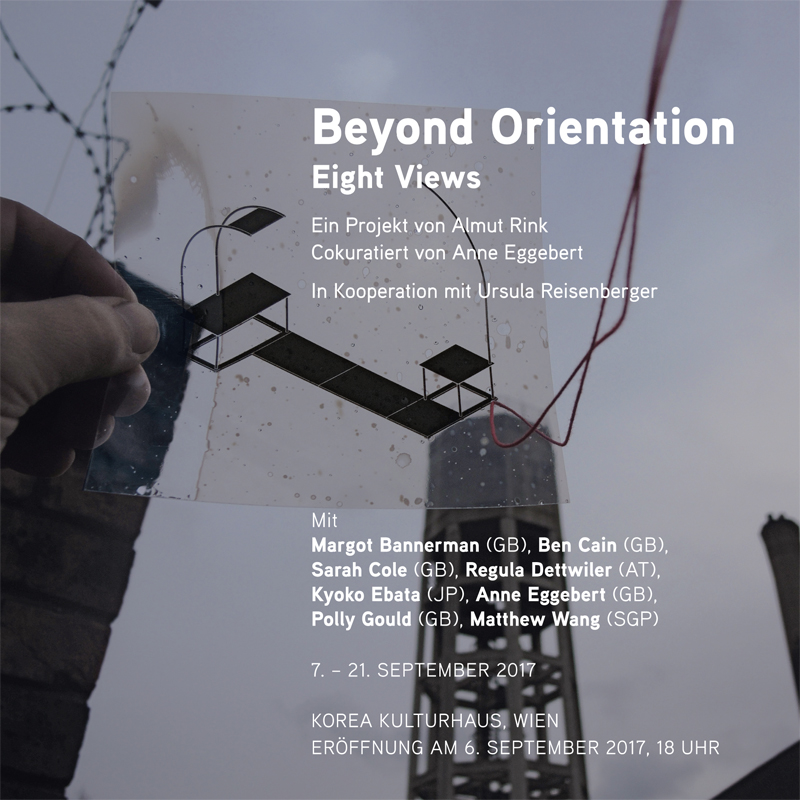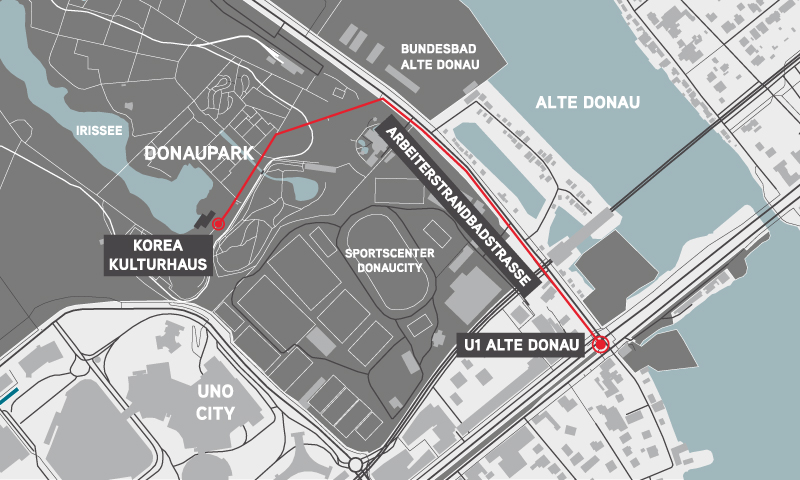
BEYOND ORIENTATION
Eight Views
A project by
Almut Rink
Co-curated by
Anne Eggebert
With contributions by
Margot Bannerman (GB), Ben Cain (GB),
Sarah Cole (GB), Regula Dettwiler (AT),
Kyoko Ebata (JP), Anne Eggebert (GB),
Polly Gould (GB), Matthew Wang (SGP)
In cooperation with
Ursula Reisenberger
Korea Kulturhaus, Arbeiterstrandbadstraße 122, 1220 Wien
September 7th – September 21st 2017
Opening reception: Wednesday, September 6th 2017, 6 pm
Speakers
Ernst Nevrivy, Hirector of the 22nd District, Vienna
Michaela Glanz, Academy of Fine Arts, Vienna
Almut Rink, Project Director
Opening performance
Orientation provides us with an idea about the world around us. “Beyond Orientation” questions its underlying structures, extends and moves them so that placing ourselves can be experienced as a dynamic process. Including all constitutive elements, it is sustainable, but not static. The exhibition “Beyond Orientation. Eight Views” is the third part of the research project “Orientation as Gardening” (conceived by Viennese artist Almut Rink and author Carola Platzek, funded by Science Fund Austria). It continues their arts based research in the form of a curated group exhibition at the Korea Kulturhaus Vienna.
The Research Project “Orientation as Gardening”
The project has taken place in public spaces in Tokyo, London and Vienna over the course of two years and, deriving from three historic systems of composition, explores orientation as an active composing (“gardening”) of our being in the world.
The first part of the research project looked to Asia in search of sustainable concepts of orientation. There, the basic principle of “situation and potential” contains an organic idea of order. As opposed to the European “plan and goal” (Francois Jullien), it follows the laws of nature.
Almut Rink has developed eight Assemblage Boards as central tools for the project. Referencing Japanese Tana-kazari, small handmade shelves that are used to display bonsai or suiseki stones, the shelves have been enlarged to human size and were placed in a park in Tokyo, used as a tool, frame or stage. Turning around the hierarchy between subject and object, plant and human, stone and onlooker, the Boards acted as a vantage point for questioning an anthropocentric perspective.
In Chinese and Japanese painting there is a tradition of “Eight Views”, of looking at the same landscape in eight different ways. In their totality they relate to the portrayed site and simultaneously point to all other possible views that are contained in the site and therefore point to the void surrounding the views.
The idea of Eight Views has become a basic principle for the whole project. In their work for Zenpukuji Park, Almut Rink and Carola Platzek chose eight sites for the Assemblage Boards, creating eight different work situations, one for each day.
The second part of the project was about bringing these experiences to a Western, dense urban context, to the King’s Cross development in London (in co-operation with Central Saint Martins, University of the Arts London).
In Japanese tradition a non-anthropocentric view of the world is deeply rooted; relating to the surroundings through the Boards proved therefore to be relatively easy. In Europe, this approach turned out to be more difficult. The Boards turned out to be hard to access, some being only virtually present or absent altogether.
Almut Rink continued to work with and around the Boards for another eight days. Once each day she was met by the audience of a performative walk covering all the Board locations, led by Ursula Reisenberger. Whereas in Japan the focus had been on searching for a personal experience with an alternative approach to the world, in London the research was extended and explicitly included the encounter and sharing with an audience.
Beyond Orientation. Eight Views
Vienna
The final part “Beyond Orientation. Eight Views” brings the London and Tokyo experiences back to Vienna.
Almut Rink
will continue her research and, together withAnne Eggebert
as a co-curator, will open the space for an exchange with eight artists. The exhibition will open up a discourse space for a temporary collective.The Korea Pavilion at the outskirts of the city will act as host, providing a space that merges nature and architecture. Coming from the antique idea of a “Care of the Self” that was re-discovered by Foucault, Almut Rink will continue a discourse started in Japan: she will explore the subject not as an entity but as a process composed of relationships – above all a relationship with itself.
The eight Assemblage Boards will turn into supporting structures, framing the other artworks and setting up relationships between them. They will enter into a dialogue with them, adapt to them, frame them, contradict. Out of the relationship between the two works, a moment of encounter will evolve, a portrait of the present moment.
What links the artworks are questions of orientation and cultivation, care and relationship, autonomy and dependence.
Margot Bannerman (GB)
draws marked zones in the Iris Lake, islands of the precariat, fragile organic habitats, which can only survive with floatation support and (according to Ernst Mach) become the metaphor of the “I” as a temporary sum of sensations;Ben Cain (GB)
deploys the gesture, rupture and gap between things, to reflect on the marginal, and examine blurs and mergers in designations such as subject / object, influencing / being influenced, passive / active;Sarah Cole (GB)
reflects in her video on experiences of isolation, endurance and the oscillation between self-determination and determination inherent in the profession of long-term carers;Regula Dettwiler’s (AT)
territory is the organic, here as a symbolic mapping of the psychological affects we might read through the materiality of our world;Kyoko Ebata (JP)
is washing an endless loop of Japanese flags, which in the context of the pavilion – as a place of the Korean community – become a commentary of a difficult common history, cleaned and hung up to dry;Anne Eggebert (GB)
reflects on a sense of placeness through the proximal, the distant and the virtual, and mulls over the problem of trying to picture place as a means of a subjective connection to the other-in-place;Polly Gould’s (GB)
sound installation in text and sound becomes a sensory exploration of the pavilion and conceives it as a host with its inherent structures and surfaces, as an independent entity;Matthew Wang (SGP)
will trace a part of the connecting line between London and Vienna physically. Applied to the care of others, he walks from Berlin to Vienna to join the opening of the exhibition and will then remain in situ to take care of the work of the others.Ursula Reisenberger (AT)
, who accompanies “Beyond Orientation” as a co-operation partner, opens up a potential space along an unconditional presence, in which the performative body can be experienced as a connecting instrument to the here and now.In their totality, the artworks – like the classical Eight Views of Chinese and Japanese painting – hint at the greater, the whole abundance of possible orientations: beyond the concrete examples they open up a space that contains them, but doesn’t understand them as an absolute. In the same way, the very display of the artworks transcends the staging of an individual position as well as the limitations of the building, also including its natural surroundings.
Thus, the exhibition is less of a finite presentation than of an open laboratory: a participatory space, that understands “beyond” as a vector. Like the Assemblage Boards, the exhibition acts as a tool, a stage, moving and widening the understanding of “Mit-Welt” (co-world) and inviting it to assemble and share.


Reaching Korea Kulturhaus
U1 direction Leopoldau, get off at Alte Donau
Along Arbeiterstrandbadstraße untill Bundesbad Alte Donau, turn left to into the Donaupark, the pavilion is 100 metres ahead.